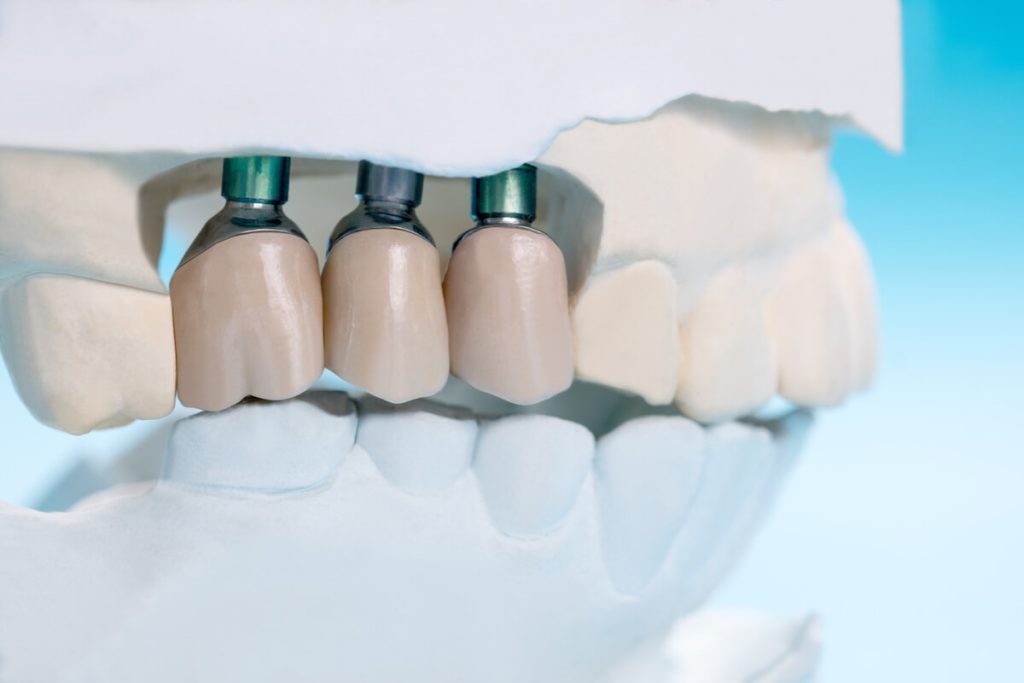Are Dental Implants Safe? We Have All The Answers You Need

Are dental implants safe? You may ask this question when considering your best tooth replacement options.
Because of their advantages, implants have become the method of choice for many dentists.
But are dental implants safe for everyone? Are there situations when a dentist shouldn’t use them?
We have all the answers in this blog post, so settle down for the read.
What are the benefits of dental implants?
Dental implants are one of the most reliable procedures, with a 95% success rate.
Moreover, implants offer advantages that other tooth replacement options, such as dentures and bridges, do not. Namely,
- Natural Appearance –Implants bear an uncanny resemblance to natural teeth
- Enhanced Comfort – Unlike dentures, which can sometimes irritate the gums and shift around in the mouth, implants are securely anchored into the jawbone. This stability eliminates discomfort and makes speaking, eating, and smiling effortless.
- Improved Speech – No need to worry about unsteady bridges or loose dentures causing slurred speech and embarrassment
- Bone Health Preservation—Dental implants’ capacity to maintain and stimulate the jawbone is one of their many important advantages. When a tooth is lost, the jawbone deteriorates due to a lack of stimulation. Implants supply the stimulation required to stop bone loss and even encourage the formation of new, healthy bones.
- Youthful appearance – Implants close the gaps and fill out the cheeks and lips to give a younger appearance both now and in the years to come
We want our patients to receive the best results from their treatment, so we recommend dental implants over bridges and dentures.
This leads nicely to whether dental implants are safe for everyone.
Who can have dental implants?
For over 50 years, dentists have safely and successfully fitted dental implants into patients’ mouths in good oral care and physical health.
There are a few conditions, however, that could prevent the immediate use of implants, including:
- Active periodontal disease (gum disease)
- Pre-existing chronic diseases like heart disease or diabetes
- Insufficient jawbone to hold the implant in place
However, these conditions don’t entirely prevent a patient from having dental implant surgery:
- If gum disease is a problem, the dentist can treat this before going ahead with the dental implant procedure
- If you have a pre-existing chronic disease, we will consult closely with your doctor to reach a decision
- If you lack sufficient bone to secure the implant, we can often use a bone graft to generate more bone tissue
That said, there are a few circumstances where a patient would be advised not to undergo the dental implant procedure.
Who should not have dental implants?
Some people with metal allergies
Implants are made from titanium and a small proportion of other metal alloys.
While titanium is biocompatible for most people, some are sensitive to nickel, zinc, and copper.
In this case, your dentist may recommend an alternative dental solution to replace your teeth.
Also, people with metal dental fillings can negatively react with titanium. Your Northbridge dentist can determine if these other metals prevent you from having dental implants.
Heavy smokers
If you are a heavy smoker and unwilling to stop during the dental implant procedure, implants are not a suitable treatment.
Smoking restricts the blood vessels and inhibits the supply of oxygen.
As a result, the blood flows slower to the site, and healing takes longer. Sometimes, the bone fusion necessary for a successful outcome fails.
Those who have heart conditions or chronic disease
Let’s not forget that getting dental implants requires a short surgical procedure.
It may not be ideal, therefore, for those with extreme heart conditions to be placed in a state of anaesthesia. If in doubt, seek advice from your doctor.
Is the Dental Implant Procedure Safe?
Dental implant surgery is necessary for anyone who wishes to have implants.
Our dentists are highly experienced and have successfully placed hundreds of implants, so rest assured, you are in safe hands.
We take a full-mouth X-ray (OPG) of your teeth, jawbone, and surrounding structures to determine whether you are suitable for implants and create a tailored treatment plan.
Our dentist uses a surgical guide for accurate and precise implant placement, avoiding nerves and blood vessels and enhancing implant stability and longevity.
Meticulous planning before surgery provides patients with a shorter, safer, and more comfortable experience.
We also ask patients to attend regular follow-up appointments during recovery to monitor healing and check that osseointegration or bone fusion is going as planned.
Once the implant has stabilised, it’s time to fit the abutment and dental crown to complete the restoration.
Multiple steps are necessary for dental implants, so patients can expect their treatment to take between 6 and 9 months.
So, are dental implants safe?
With an experienced dental team and high-quality materials, the answer is yes. Absolutely!
Dental Implants in Northbridge
If you’d like to learn more about dental implants and whether they are a suitable treatment, why not schedule a consultation with the experienced dental team at My Local Dentists.
Call us at (02) 8318 5966 or visit us at Shop 20A Northbridge Plaza, 79-113 Sailors Bay Road in Northbridge.
